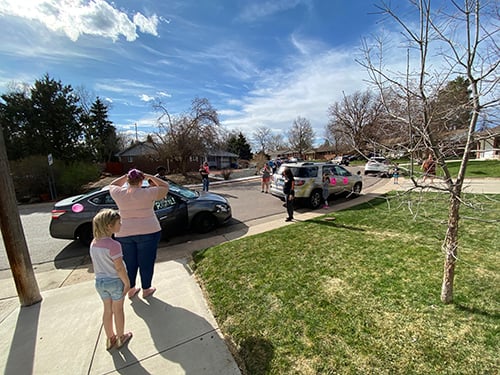Struggling with depression as a teenager, Rachel Johnson came to a pivotal moment in her young life.
“I was either going to kill myself or kill myself for who I was, and become the person I wanted to be instead of struggling with who I was,” said Johnson. Fortunately, she met a social worker who gave her permission to live life “the way she wanted to be.” That moment changed her forever. It’s the moment she discovered a passion for social work. “I thought I could help others by sharing my experience and cultivating mental health therapy as my specialty.”
After earning a bachelor’s degree, she earned a master’s in medical social work. She began working in a nursing home with nurses and fantastic clinical partners. “I loved it. It was the most challenging place to work.” It opened her eyes to those living with chronic illness and the role of psychosocial intervention in healthcare. She asked herself “Can’t we do better than this? Isn’t there a better way to help these patients?”
Later, while working on an NIH grant at the Veteran’s Administration (VA) in psychosocial intervention and chronic illness, she found her niche – straddling research and clinical domains. She also discovered she needed to understand her research colleagues and speak to them in their language. “Research was the class I hated in school, but the more I learned, the more excited and passionate I became,” said Johnson.
After successfully defending her thesis on Zoom during the pandemic, Johnson’s
friends gave her a parade. “That made me feel special! I’ve never had a parade
in my honor before!”
As she ramped up her skills to operate in the research world, she found she had a lot to offer in terms of unique perspective and decided to pursue a PhD in Caring Science. Johnson is the first interdisciplinary graduate of the program. “For years I didn’t think it a possibility, but then a friend asked ‘why?’” Reflecting on that question, Johnson realized she had to be the change she wanted to be and not rely on others.
Knowing she needed a supportive environment to lift her up, she chose CU College of Nursing for her degree. “I felt an immediate connection. I could reconnect to the child I was to develop into the research and interdisciplinary thinker I am,” said Johnson.
Today, Johnson is a full-time researcher in the VA. She bridges a variety of departments including suicide prevention, opioid abuse, and care coordination. “Unitary Caring Science teaches that everything is interconnected. It never made sense to me to treat mental health without considering physical conditions,” said Johnson. With a goal of improving health care by shaping and guiding it to be more caring focused and holistic, Johnson proves that she cannot be “pigeon-holed.”
Looking back to where she’s come from, “I wouldn’t choose to not go through the pain I did as a young adult. It made me who I am.”




